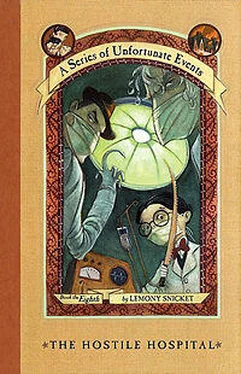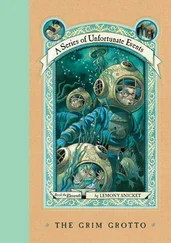Lemony Snicket - The Hostile Hospital
Здесь есть возможность читать онлайн «Lemony Snicket - The Hostile Hospital» весь текст электронной книги совершенно бесплатно (целиком полную версию без сокращений). В некоторых случаях можно слушать аудио, скачать через торрент в формате fb2 и присутствует краткое содержание. Год выпуска: 2001, Жанр: Прочие приключения, на английском языке. Описание произведения, (предисловие) а так же отзывы посетителей доступны на портале библиотеки ЛибКат.
- Название:The Hostile Hospital
- Автор:
- Жанр:
- Год:2001
- ISBN:нет данных
- Рейтинг книги:4 / 5. Голосов: 1
-
Избранное:Добавить в избранное
- Отзывы:
-
Ваша оценка:
- 80
- 1
- 2
- 3
- 4
- 5
The Hostile Hospital: краткое содержание, описание и аннотация
Предлагаем к чтению аннотацию, описание, краткое содержание или предисловие (зависит от того, что написал сам автор книги «The Hostile Hospital»). Если вы не нашли необходимую информацию о книге — напишите в комментариях, мы постараемся отыскать её.
The Hostile Hospital — читать онлайн бесплатно полную книгу (весь текст) целиком
Ниже представлен текст книги, разбитый по страницам. Система сохранения места последней прочитанной страницы, позволяет с удобством читать онлайн бесплатно книгу «The Hostile Hospital», без необходимости каждый раз заново искать на чём Вы остановились. Поставьте закладку, и сможете в любой момент перейти на страницу, на которой закончили чтение.
Интервал:
Закладка:
"Yes there is!" Violet said. "Look!"
The Baudelaires looked at the file where Klaus had dropped it on the ground. There, behind the note, was a single sheet of paper. "It's page thirteen," Violet said, looking at a number typed in a corner of the paper. "The investigators must have left it behind by mistake."
"That's why you should keep paper clips on papers that belong together," Klaus said, "even when you file them. But what does the page say?"
With a long crackle! and a loud bang, the door to the Library of Records was knocked off its hinges, and fell to the floor of the enormous room as if it had fainted. But the children paid no attention. Violet, Klaus, and Sunny all sat and looked at page thirteen of the file, too amazed to even listen to the odd, teetering footsteps as the intruder entered the room and began to walk along the aisles of file cabinets.
Page thirteen of the Baudelaire file was not a crowded sheet of paper--there was just one photograph stapled into place, below one sentence of type. But sometimes it takes only a photograph and a sentence to make an author cry himself to sleep even years after the photograph was taken, or to make three siblings sit and stare at a page for a long time, as if an entire book were printed on one sheet of paper.
There were four people in the photograph, standing together outside a building the Baudelaires recognized immediately. It was 667 Dark Avenue, where the orphans had lived with Jerome and Esmé Squalor for a brief time, until it became another place too treacherous for the children to stay. The first person in the photograph was Jacques Snicket, who was looking at the photographer and smiling. Standing next to Jacques was a man who was turned away from the camera, so the children could not see his face, only one of his hands, which was clutching a notebook and pen, as if the obscured man were a writer of some sort. The children had not seen Jacques Snicket since he was murdered, of course, and the writer appeared to be someone they had never seen at all. But standing next to these two people were another two people the Baudelaire children thought they would never see again. Bundled up in long coats, looking cold but happy, were the Baudelaire parents.
"Because of the evidence discussed on page nine," read the sentence above the photograph, "experts now suspect that there may in fact be one survivor of the fire, but the survivor's whereabouts are unknown."
Chapter Seven
"I never thought I'd live to see the day," Violet said, and took another look at page thirteen of the file. The Baudelaire parents looked back at her, and for a moment it seemed to Violet her father would step out of the photograph and say, "There you are, Ed. Where have you been?" Ed was short for Thomas Alva Edison, one of the greatest inventors of all time, and it was a special nickname only used by her father, but the man in the photograph did not move, of course, but only stood smiling in front of 667 Dark Avenue.
"Me neither," Klaus said. "I never thought we'd see our parents again." The middle Baudelaire looked at his mother's coat, which had a secret pocket on the inside. In the secret pocket, she often kept a small pocket dictionary, which she would take out whenever she encountered a word she did not know. Because Klaus was so interested in reading, she had promised that someday she would give the pocket dictionary to him, and now it seemed to Klaus that his mother was about to reach into her coat and put the small, leatherbound book in his hand.
"Neither me," Sunny said. She looked at her parents' smiles, and suddenly remembered, for the first time since the fire, a song that her mother and father used to sing together, when it was time for Sunny to go to sleep. The song was called "The Butcher Boy," and the Baudelaire parents would take turns singing the verses, her mother singing in her breathy, high voice, and her father in his, which was as low and deep as a foghorn. "The Butcher Boy" was the perfect way for Sunny to end the day, safe and cozy in the Baudelaire crib.
"This photograph must have been taken a long time ago," Violet said. "Look how much younger they look. They aren't even wearing their wedding rings."
"'Because of the evidence discussed on page nine,'" Klaus said, reading the sentence typed above the photograph, "'experts now suspect that there may in fact be one survivor of the fire, but the survivor's whereabouts are unknown.'" He stopped, and looked at his sisters. "What does that mean?" he said, in a very faint voice. "Does that mean one of our parents is still alive?"
"Well, well, well," said a familiar and sneering voice, and the children heard the odd, tottering footsteps walk straight toward them. "Look what we have here."
The Baudelaire orphans had been so shocked by what they had found that they had forgotten about the person breaking into the Library of Records, and now they looked up to see a tall skinny figure walking down the B aisle STOP. It was a person they had seen recently, and one they had hoped never to see again. There are many different ways of describing this person, including "Count Olaf's girlfriend," "the Baudelaire children's former guardian," "the city's sixth most important financial advisor," "a former resident of 667 Dark Avenue," and several phrases that are far too nasty to be placed in a book. But the name she preferred was the one that came snarling out of her lipsticked mouth.
"I am Esmé Gigi Geniveve Squalor," said Esmé Gigi Geniveve Squalor, as if the Baudelaires would ever forget her, no matter how hard they tried. She stopped walking and stood in front of the Baudelaires, who saw immediately why her footsteps had been so odd and tottering. For as long as the children had known her, Esmé Squalor had been a slave to fashion, a phrase which here means "dressed in incredibly expensive, and often incredibly absurd, outfits." This evening she was wearing a long coat made from the fur of a number of animals that had been killed in particularly unpleasant ways, and she was carrying a handbag shaped like an eye, just like the tattoo her boyfriend had on his left ankle. She wore a hat with a small veil that hung in front of her face, as if she had blown her nose with a black lacy handkerchief, and then forgotten to remove it, and on her feet she had a pair of shoes with stiletto heels. A stiletto is a small, slender knife resembling a dagger, such as might be carried by a carnival performer or a murderer, and the word "stiletto" has been used to describe a woman's shoe with a very long and narrow heel. In this case, however, the phrase "shoes with stiletto heels" actually refers to a pair of shoes made with a small, slender knife where each heel should be. The stilettos were pointing straight down, so that Esmé viciously stabbed the floor of the Library of Records with each step, and occasionally the stilettos stuck, so the wicked woman had to pause and yank them out of the floor, which explained why her footsteps were so odd and tottering. These shoes happened to be the absolute latest fashion, but the Baudelaires had more important things to do than leaf through magazines describing what was in and what was out, so they could only stare at Esmé's shoes and wonder why she was wearing footwear that was so violent and impractical.
"This is a pleasant surprise," Esmé said. "Olaf asked me to break in here and destroy the Baudelaire file, but now we can destroy the Baudelaires as well."
The children looked at each other in shock. "You and Olaf know about the file?" Violet asked.
Esmé laughed in a particularly nasty way, and, from behind her veil, smiled a particularly nasty smile. "Of course we know about it," she snarled. "That's why I'm here--to destroy all thirteen pages." She took one odd, tottering step toward the Baudelaires. "That's why we destroyed Jacques Snicket." She took another stabbing step down the aisle. "And that's why we're going to destroy you." She looked down at her shoe and shook her foot wildly to get the blade out of the library floor. "Heimlich Hospital is about to have three new patients," she said, "but I'm afraid it'll be too late for any doctor to save their lives."
Читать дальшеИнтервал:
Закладка:
Похожие книги на «The Hostile Hospital»
Представляем Вашему вниманию похожие книги на «The Hostile Hospital» списком для выбора. Мы отобрали схожую по названию и смыслу литературу в надежде предоставить читателям больше вариантов отыскать новые, интересные, ещё непрочитанные произведения.
Обсуждение, отзывы о книге «The Hostile Hospital» и просто собственные мнения читателей. Оставьте ваши комментарии, напишите, что Вы думаете о произведении, его смысле или главных героях. Укажите что конкретно понравилось, а что нет, и почему Вы так считаете.












